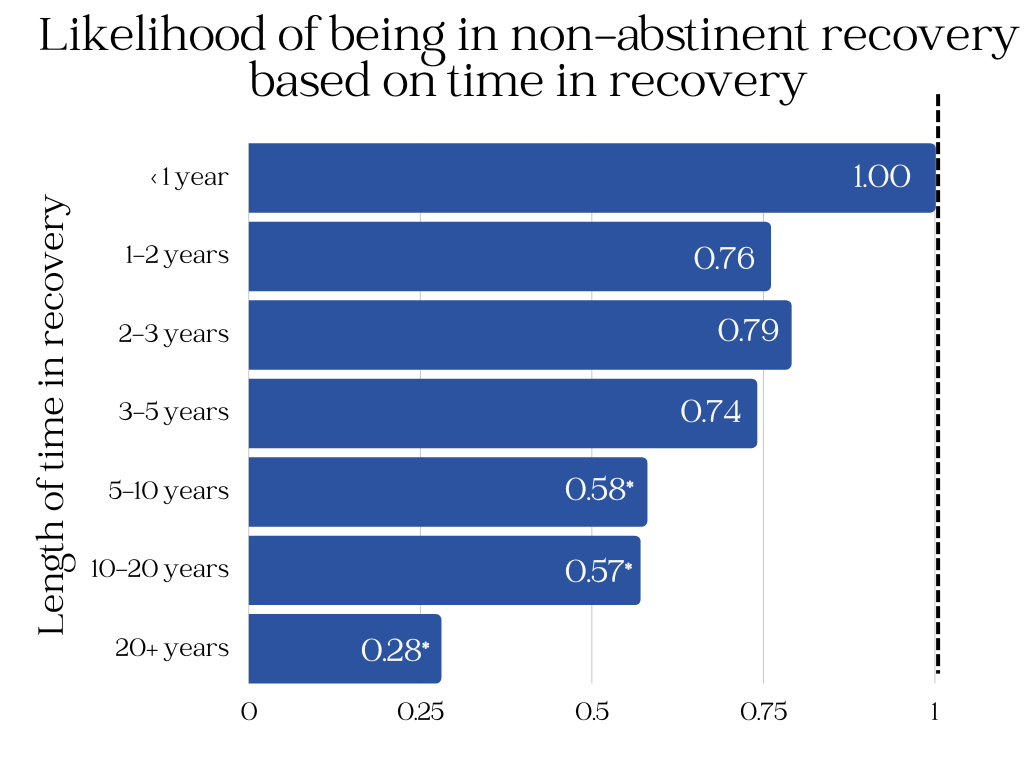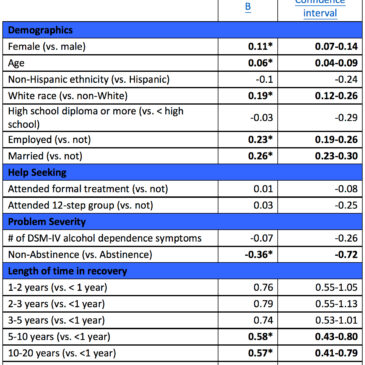Members of the treatment community disagree about whether abstinence is required to recover from addiction. Many individuals who still consume alcohol consider themselves “in recovery.” This week, The DRAM reviews a study by Meenakshi Sabina Subbaraman and Jane Witbrodt that examined whether quality of life differs between abstinent and non-abstinent individuals who self-identify as “in recovery.”
What was the research question?
How do abstinent and non-abstinent people in recovery differ, and how does abstinence relate to quality of life?
What did the researchers do?
Over 5,000 individuals 18 years or older self-identifying as “in recovery” from alcohol and/or drugs were recruited from The WIR (What Is Recovery?) study dataset.[1] Participants completed a 15-minute online survey that included questions about treatment history, substance use, length of time in recovery, demographics, Quality of Life, and other topics. The researchers defined abstainers as people in recovery who refrain from alcohol consumption completely. They defined non-abstainers as people who consider themselves in recovery but still use alcohol to any degree.
What did they find?
Older people, and people who had been in recovery longer, were more likely to report abstinence. As the Figure shows, people in recovery for 5-10, 10-20, or 20+ years were significantly less likely to be in non-abstinent recovery than people with less than 1 year in recovery. Additionally, abstainers reported significantly higher quality of life than non-abstainers, even when the researchers controlled for all demographic and help seeking variables. Controlling for all other measured factors, people who had been in recovery for at least five years reported higher quality of life than people in early recovery.

Figure. Adjusted Odds Ratios for predicting non-abstinent recovery (vs. abstinent recovery) from time in recovery. Asterisks represent statistically significant effects. Adapted from Subbaraman and Witbrodt (2014).
Why do these findings matter?
These findings could help clinicians and other treatment professionals, as well as people in recovery. Some people in recovery focus on improving their lives without staying completely abstinent; however, according to these findings, abstinence might be best for quality of life. Because many individuals experiment with non-abstinent (i.e. harm reduction) strategies early on before choosing abstinence, it is important to learn more about the transition from non-abstinence to abstinence (or vice versa) and associated outcomes.
Every study has limitations. What were the limitations in this study?
The study sample was mostly Caucasian, and the majority were well educated. So these findings might not apply to the general population. Additionally, due to the study design, they cannot conclude that abstinence causes higher quality of life. Researchers would need to gather more evidence in order to support this interpretation.
For more information:
If you or a loved one is struggling with alcohol/drug-related issues, please visit our Addiction Resources page.
For more information about substance abuse treatment, please visit the Substance Abuse and Mental Health Services Administration website.
— Anjali A. Talcherkar
What do you think? Please use the comment link below to provide feedback on this article
[1] Participants ranged from less than one year to over twenty years in recovery and were recruited to the WIR study through newspaper ads, Craigslist, social media, and various outreach strategies. Although not specified in the WIR recruitment materials, The WIR defines recovery as “ways of being and as a growth and learning process involving internal values and self-awareness with moral dimensions.”




